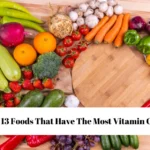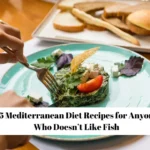The Mediterranean diet has gained immense popularity for its health benefits, particularly for weight loss. This diet, inspired by the traditional eating habits of countries bordering the Mediterranean Sea, focuses on whole foods, healthy fats, and lean proteins. It’s not just about eating less but choosing nutrient-dense foods that naturally promote fat loss, enhance metabolism, and improve overall well-being.
Foods like whole grains, fresh vegetables, fatty fish, and olive oil make this diet an excellent option for sustainable weight management. In this blog, we’ll explore 15 Mediterranean diet foods for weight loss, providing you with a comprehensive guide to making healthier choices that aid in shedding those extra pounds while keeping you energized and satisfied.
Whole Grains: A Mediterranean Staple for Weight Loss
Whole grains like barley, bulgur, farro, and whole wheat are a cornerstone of the Mediterranean diet. These grains are packed with fiber, which plays a crucial role in weight loss by promoting satiety and reducing overall calorie intake. Fiber-rich foods slow digestion, helping to keep you full longer and prevent overeating. Whole grains also stabilize blood sugar levels, which reduces cravings for sugary snacks that can lead to weight gain.
Additionally, they provide a steady release of energy, making them ideal for maintaining stamina during physical activities that support weight loss. Unlike refined grains, which are stripped of their nutritional value, whole grains retain essential nutrients such as magnesium, selenium, and B-vitamins, which are vital for overall health. Incorporating whole grains into your meals, such as replacing white rice with quinoa or using whole grain pasta, is a simple but effective strategy for those looking to shed extra pounds without sacrificing flavor or nutrition.
Fresh Vegetables: The Foundation of the Mediterranean Diet
Fresh vegetables like leafy greens, tomatoes, cucumbers, bell peppers, and zucchini are abundant in the Mediterranean diet. They are low in calories and high in nutrients, making them excellent choices for weight loss. Vegetables are rich in vitamins, minerals, antioxidants, and fiber, which all contribute to a healthy metabolism and a reduction in fat storage. The fiber content helps to keep you feeling full while improving digestion, preventing constipation, and regulating blood sugar levels.
The variety of vegetables in the Mediterranean diet also means you can consume large portions without consuming excessive calories, allowing for satisfaction without weight gain. Roasted or grilled vegetables, colorful salads, or vegetable-based soups are delicious and easy ways to add these weight-loss-friendly foods to your diet. By focusing on plant-based foods, the Mediterranean diet promotes a high volume of food with low energy density, which is key for successful and sustainable weight loss.
Olive Oil: The Healthy Fat that Helps Burn Fat
Olive oil, particularly extra virgin olive oil, is a key component of the Mediterranean diet and plays an unexpected role in weight loss. Although it is a fat, it is a healthy monounsaturated fat, which has been shown to reduce belly fat, improve cholesterol levels, and decrease the risk of heart disease. Olive oil contains oleic acid and antioxidants like polyphenols, which have anti-inflammatory properties that help with fat loss by improving metabolic health.
Unlike unhealthy trans fats or saturated fats, olive oil aids in nutrient absorption and keeps you satisfied, preventing overeating. Its unique ability to promote the feeling of fullness helps reduce cravings for high-calorie, processed foods that often lead to weight gain. Incorporating olive oil into your diet by using it as a salad dressing, drizzling it over roasted vegetables, or adding it to marinades is a delicious way to reap its fat-burning benefits. The Mediterranean diet’s emphasis on healthy fats helps balance the body’s need for fats while promoting weight loss.
Fatty Fish: A Protein-Rich Choice for Fat Loss
Fatty fish such as salmon, sardines, mackerel, and tuna are essential in the Mediterranean diet and play a significant role in weight loss. These fish are high in omega-3 fatty acids, which are known to reduce inflammation, improve heart health, and aid in fat burning. Omega-3s promote the breakdown of fats and prevent fat storage, which is crucial for losing weight. In addition to healthy fats, fatty fish provide high-quality protein, which helps in muscle maintenance and growth.
Muscle mass is important for burning calories, as muscles are metabolically active and increase your resting metabolic rate. The protein in fish also enhances satiety, reducing the chances of overeating and snacking on unhealthy foods. For effective weight loss, aim to include fatty fish in your meals at least twice a week. Whether grilled, baked, or incorporated into salads, these fish add flavor while supporting your weight loss goals.
Legumes: Fiber and Protein for Weight Loss
Legumes, including lentils, chickpeas, black beans, and peas, are a vital part of the Mediterranean diet and are particularly beneficial for those aiming to lose weight. They are rich in both fiber and plant-based protein, which work together to promote feelings of fullness and prevent overeating. The high fiber content helps regulate digestion and prevents spikes in blood sugar, which can lead to cravings for unhealthy foods. Protein, on the other hand, is essential for maintaining lean muscle mass while losing fat.
Legumes also have a low glycemic index, meaning they release sugar into the bloodstream slowly, providing sustained energy without causing insulin spikes. This makes them a perfect food choice for weight management. Moreover, legumes are versatile and can be added to salads, soups, or main dishes, providing a hearty, satisfying component that is low in calories and high in nutritional value. For those looking to cut calories while still feeling satisfied, legumes are a must-have in the diet.
Nuts and Seeds: Small But Mighty for Weight Loss
Nuts and seeds, such as almonds, walnuts, chia seeds, and flaxseeds, are small but incredibly nutrient-dense foods that are part of the Mediterranean diet’s weight loss strategy. While they are higher in fat and calories compared to other plant-based foods, the fats they contain are heart-healthy unsaturated fats that actually support fat loss. They are also a great source of protein and fiber, both of which are essential for controlling appetite and keeping you full for longer.
Nuts and seeds help to regulate blood sugar levels and prevent the kind of spikes and crashes that lead to cravings for sugary snacks. A handful of nuts or a sprinkle of seeds can be an excellent snack or addition to meals like salads, yogurt, or oatmeal. Their healthy fats and nutrient content make them a satisfying option that keeps you energized while supporting your weight loss efforts.
Lean Poultry: High-Protein, Low-Calorie Option
Lean poultry such as chicken and turkey is another weight-loss-friendly food featured in the Mediterranean diet. Poultry is an excellent source of lean protein, which helps preserve muscle mass while losing fat. Protein-rich foods like poultry require more energy to digest compared to fats and carbohydrates, a process known as the thermic effect of food, which boosts metabolism and increases calorie burn.
The high protein content also reduces hunger by increasing satiety, preventing the temptation to snack on high-calorie foods. When preparing lean poultry, opt for grilling, baking, or steaming instead of frying to keep the calorie content low. Pairing lean poultry with vegetables and whole grains is a great way to create balanced, nutrient-dense meals that promote weight loss without compromising on taste.
Greek Yogurt: A Creamy, Protein-Packed Snack
Greek yogurt is a popular component of the Mediterranean diet and a fantastic food for weight loss. Compared to regular yogurt, Greek yogurt has twice the amount of protein, which is crucial for keeping you full and supporting muscle mass during weight loss. Protein also helps stabilize blood sugar levels, preventing energy crashes and cravings for unhealthy foods.
Greek yogurt is also a good source of probiotics, which promote gut health. A healthy gut is essential for weight management, as it aids digestion and helps the body break down food more efficiently. The creaminess and satisfying texture of Greek yogurt make it a versatile food that can be eaten on its own, topped with fruit and nuts, or added to smoothies for an extra protein boost. When choosing Greek yogurt, go for plain, unsweetened varieties to avoid added sugars that can hinder weight loss.
Fresh Fruits: Nature’s Sweet, Low-Calorie Treat
Fruits such as berries, apples, oranges, and grapes are a significant part of the Mediterranean diet and are excellent for weight loss. These fruits are low in calories and high in fiber, which helps control hunger and keep you feeling full longer. The natural sugars in fruit provide a healthier alternative to processed snacks and desserts, reducing cravings for sugary treats that contribute to weight gain.
Fruits are also loaded with vitamins, minerals, and antioxidants that support overall health and improve metabolism. Berries, in particular, are rich in fiber and low in calories, making them an ideal snack for weight management. Incorporating a variety of fruits into your meals as snacks, desserts, or even additions to salads will not only satisfy your sweet tooth but also help you stay on track with your weight loss goals.
Eggs: A High-Protein Breakfast Option for Weight Loss
Eggs are another protein-rich food that plays a role in the Mediterranean diet’s approach to weight loss. A single egg contains around 6 grams of high-quality protein, making it a filling and satisfying option, especially when eaten for breakfast. Starting the day with a protein-packed meal like eggs can reduce hunger later in the day, helping to control overall calorie intake.
Eggs also contain essential nutrients like vitamin D, B vitamins, and choline, which support metabolic health and fat burning. Additionally, eggs have a low calorie count, so they provide satiety without adding extra calories. Whether boiled, scrambled, or poached, eggs are a versatile and quick-to-prepare food that can fit into any meal plan aimed at weight loss.
Herbs and Spices: Flavorful Additions That Boost Metabolism
Herbs and spices such as oregano, basil, rosemary, turmeric, and cumin are widely used in the Mediterranean diet, and they provide more than just flavor — they can also assist with weight loss. These natural seasonings are packed with antioxidants and anti-inflammatory compounds that support metabolism and fat burning. For example, turmeric contains curcumin, which has been shown to reduce fat tissue growth and improve metabolic rate.
Cumin can enhance digestion, improve fat metabolism, and regulate cholesterol levels. Herbs like oregano and basil are rich in antioxidants and aid digestion, which is essential for weight management. The advantage of using herbs and spices is that they allow you to add flavor to your meals without relying on high-calorie sauces, oils, or processed additives. By seasoning your food naturally, you enhance its taste while encouraging healthy weight loss.
Avocados: Healthy Fats for Satiety and Fat Burning
Though avocados are higher in calories compared to other fruits and vegetables, they are a key part of the Mediterranean diet due to their wealth of healthy monounsaturated fats, fiber, and essential nutrients. These healthy fats help keep you full and satisfied, which can reduce the urge to snack on less healthy options. Avocados also contain fiber, which helps control appetite by promoting a feeling of fullness and improving digestion.
The high-fat content of avocados may increase fat oxidation, helping your body burn fat for energy. Avocados are also rich in potassium, a mineral that supports a healthy metabolism and helps prevent water retention, which can lead to bloating and weight gain. Incorporating avocados into your diet by adding them to salads, toast, or smoothies can support your weight loss goals while delivering a satisfying and nutrient-dense food.
Red Wine: Moderation Can Support Weight Loss
Red wine, consumed in moderation, is a hallmark of the Mediterranean diet and may even support weight loss when enjoyed responsibly. Red wine contains resveratrol, a powerful antioxidant found in the skin of grapes, which has been linked to weight loss and fat burning. Resveratrol is believed to inhibit the formation of fat cells and improve metabolism, helping to reduce body fat over time.
Additionally, red wine can have heart-protective benefits by improving cholesterol levels and reducing the risk of heart disease. However, the key to reaping these benefits lies in moderation — overconsumption of alcohol can hinder weight loss efforts by adding excess calories. For those who enjoy a glass of red wine, pairing it with a Mediterranean-style meal rich in vegetables, lean proteins, and whole grains can enhance the dining experience while keeping your weight loss goals in check.
Dark Chocolate: A Guilt-Free Indulgence in Moderation
Dark chocolate, when consumed in moderation, is another food in the Mediterranean diet that can aid in weight loss. Unlike milk chocolate, dark chocolate contains a higher percentage of cocoa, which is packed with antioxidants and flavonoids. These compounds can help improve insulin sensitivity and reduce inflammation, both of which are important for maintaining a healthy weight.
Dark chocolate is also known to reduce cravings for sweet and salty foods, making it easier to stick to a healthy eating plan. The key is portion control — small amounts of high-quality dark chocolate (70% cocoa or higher) can satisfy your sweet tooth without leading to weight gain. This indulgence can be included as part of a balanced Mediterranean diet, offering a way to enjoy treats while still working toward your weight loss goals.
Water: The Ultimate Mediterranean Weight Loss Drink
Water is an essential component of the Mediterranean diet and plays a crucial role in weight loss. Staying properly hydrated helps maintain your metabolism, allowing your body to burn calories more efficiently. Drinking water before meals can promote a sense of fullness, reducing the likelihood of overeating. Water also aids in digestion, prevents bloating, and supports the body’s natural detoxification processes, which are important for weight management.
Unlike sugary drinks or soda, water contains zero calories and helps flush out toxins that can contribute to weight gain. The Mediterranean diet encourages regular water consumption throughout the day, and replacing high-calorie beverages with water is a simple yet powerful strategy for effective weight loss. Adding slices of lemon, cucumber, or mint can make water more flavorful and enjoyable, further encouraging hydration and supporting your overall health and weight goals.
Conclusion
Incorporating these 15 Mediterranean diet foods into your daily routine can lead to effective, sustainable weight loss. With a focus on whole foods, healthy fats, and lean proteins, this diet helps control hunger, boost metabolism, and support overall health. By making simple, yet flavorful dietary changes, you can achieve your weight loss goals while enjoying delicious, nutritious meals.
FAQs
How does the Mediterranean diet help with weight loss?
The Mediterranean diet promotes weight loss by focusing on whole, nutrient-dense foods that keep you full, boost metabolism, and prevent overeating, making it easier to maintain a calorie deficit.
Can I lose belly fat with the Mediterranean diet?
Yes, the healthy fats and fiber-rich foods in the Mediterranean diet can help reduce belly fat by improving metabolism, balancing blood sugar, and promoting fat burning.




